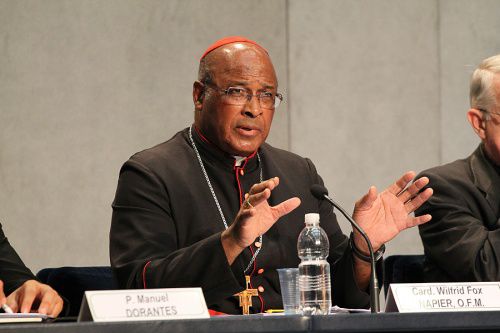A top African cardinal says that German cardinal Walter Kasper — who's stirred controversy over his views promoting Communion for the divorced and remarried — does not necessarily represent Pope Francis' theological stance.
He also rejected efforts to claim the Pope for either side of the debate ahead of the upcoming synod on the family.
South Africa's Cardinal Wilfrid Fox Napier dismissed a news report's label of Cardinal Walter Kasper as the “Pope’s theologian,” saying, “I believe Pope Francis is a theologian in his own right. So he does not need anyone to be presented as 'his' theologian.”
Cardinal Napier, the Archbishop of Durban, told CNA April 9 that the Pope is “the head of the Church in general and of the College of Bishops in particular.” “It is wrong therefore for any one group or individual to try to 'own' him or even to claim him as the adherent to one particular school or another of theology.”
Cardinal Napier had voiced concern about efforts to claim the Pope as a partisan of Cardinal Kasper in an April 4 Religion News Service article, which discussed the German cardinal's new book. The article was headlined: “Cardinal Walter Kasper, 'The Pope's Theologian,' Reveals The Brains Behind Francis' Heart.”
Cardinal Napier said on Twitter April 5 that “It's a real worry to read an expression like 'the Pope's Theologian' applied to Cardinal Kasper.” “Why is it a worry?” the African cardinal asked. “Unlike Pope Francis, Cardinal Kasper isn't very respectful towards the African Church and its leaders.”
According to Cardinal Napier, Cardinal Kasper considers African bishops to be “excessively controlled by taboo” and too reluctant to address polygamy and similar marriage problems.
His description of Cardinal Kasper apparently alludes to the German cardinal's Oct. 15, 2014 remarks to journalist Edward Pentin at the time of the Extraordinary Synod on the Family. During the conversation, Cardinal Kasper stressed his view that “Africa is totally different from the West. Also Asian and Muslim countries, they're very different, especially about gays. You can’t speak about this with Africans and people of Muslim countries. It’s not possible. It’s a taboo. For us, we say we ought not to discriminate, we don’t want to discriminate in certain respects.”
For his part, Cardinal Napier on Oct. 14, 2014 told journalists the African bishops’ worries about the synod’s controversial midterm report, known as a “relatio.”
On that occasion, Cardinal Napier had underscored that “the synod is not called to discuss contraception, abortion, same-sex marriages. It was convoked to speak about the family.” The Archbishop of Durban said that the way the report was written “conveys that there is an agreement on issues, on which there is not in fact an agreement.” He added: “I hope the line of the synod, not that of some group, prevails.”
Shortly after these comments, Cardinal Napier was appointed to the committee charged with assisting the drafting of the extraordinary synod’s final report.
Discussion over the upcoming Synod on the Family has already started months ahead of the October 2015 gathering of leading bishops from around the world. Cardinal Kasper's new book promotion tour has often been portrayed by secular media as a presentation of Pope Francis’ views of the Church. The cardinal is a vocal backer of the view that the Church can, and should, change Catholic teaching that couples who have divorced and civilly remarried without an annulment should refrain from receiving Holy Communion.
Pope Francis did choose Cardinal Kasper to address the February 2014 consistory of cardinals on the issues of family, as part of the debate ahead of the October 2014 synod. The German cardinal’s remarks have often been presented as the Pope’s views, but Cardinal Napier challenged this interpretation.
Cardinal Napier told CNA that he believes Cardinal Kasper's consistory presentation was “meant as a starting-off point for the discussion that was to follow.” The Archbishop of Durban said it has been his “clear understanding” that the 2014 synod was intended “to concentrate on identifying, describing and analyzing the major issues besetting marriage and family.” Therefore, “it was not primarily about how to understand, discuss and resolve particular problems which weigh very heavily on the Church in the different parts of the world.”
The cardinal said these problems may include marital breakdown, divorce and civil remarriage; cohabitation with or without intention to marry eventually; ministry to persons with same-sex attractions; polygamy, whether simultaneous or successive; and marriage preparation and the “accompaniment” of engaged couples. Cardinal Napier emphasized the importance of dialogue among Church leaders.
“For a real dialogue to happen, every side and every person must be given due space and time to participate,” he said. “That is the problem with Cardinal Kasper's assertion that African Bishops don't matter because as he sees them they are too constrained by taboo,” Cardinal Napier said.
The cardinal pointed out that “not all bishops in Africa are locked into a traditionalist or tribal or ideological straitjacket. Many, if not most, have embraced the Catholic faith and its teachings as fully as bishops from other traditions and cultures in the world.”
In view of the 2015 Synod's focus on the role of the family in evangelization, Cardinal Napier said that some of the senior African bishops intend to concentrate in their presentations on “the millions of good marriages that exist” while looking at how to have these marriages “support others that may be struggling.”

